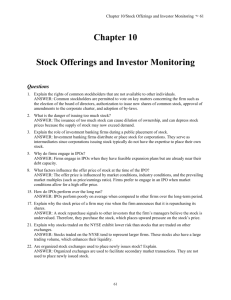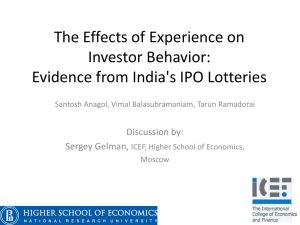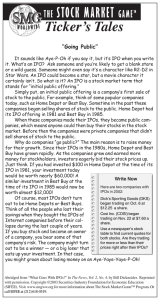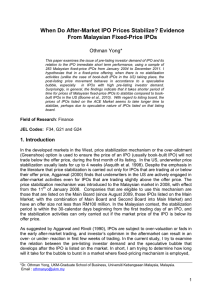Proceedings of Annual Spain Business Research Conference
advertisement
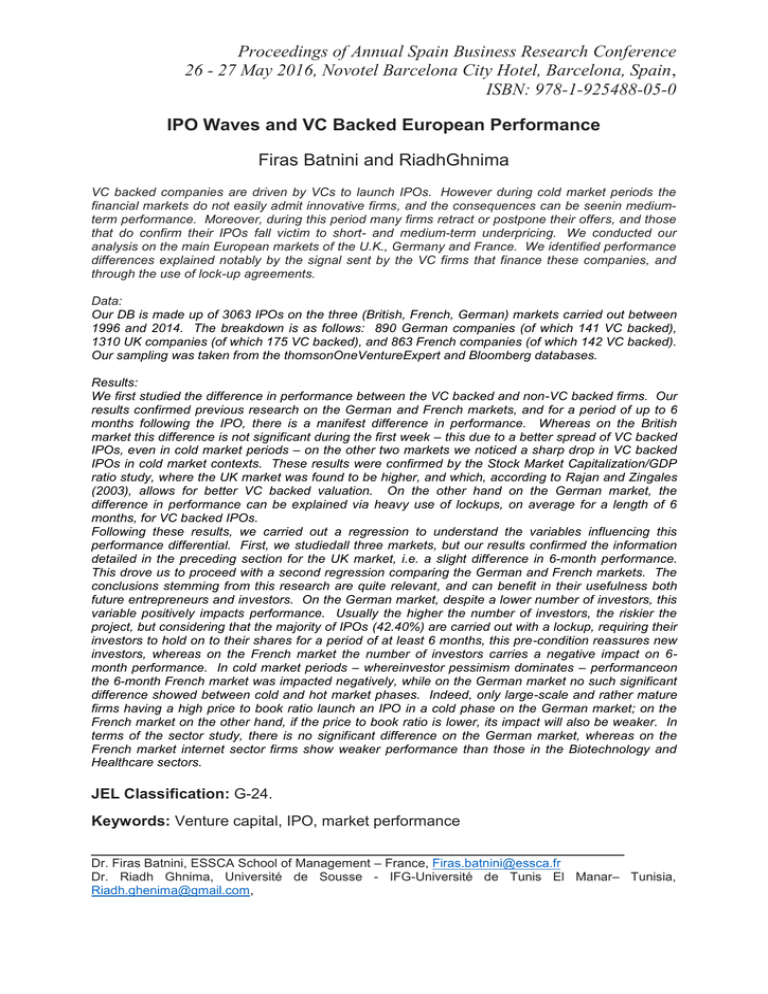
Proceedings of Annual Spain Business Research Conference 26 - 27 May 2016, Novotel Barcelona City Hotel, Barcelona, Spain, ISBN: 978-1-925488-05-0 IPO Waves and VC Backed European Performance Firas Batnini and RiadhGhnima VC backed companies are driven by VCs to launch IPOs. However during cold market periods the financial markets do not easily admit innovative firms, and the consequences can be seenin mediumterm performance. Moreover, during this period many firms retract or postpone their offers, and those that do confirm their IPOs fall victim to short- and medium-term underpricing. We conducted our analysis on the main European markets of the U.K., Germany and France. We identified performance differences explained notably by the signal sent by the VC firms that finance these companies, and through the use of lock-up agreements. Data: Our DB is made up of 3063 IPOs on the three (British, French, German) markets carried out between 1996 and 2014. The breakdown is as follows: 890 German companies (of which 141 VC backed), 1310 UK companies (of which 175 VC backed), and 863 French companies (of which 142 VC backed). Our sampling was taken from the thomsonOneVentureExpert and Bloomberg databases. Results: We first studied the difference in performance between the VC backed and non-VC backed firms. Our results confirmed previous research on the German and French markets, and for a period of up to 6 months following the IPO, there is a manifest difference in performance. Whereas on the British market this difference is not significant during the first week – this due to a better spread of VC backed IPOs, even in cold market periods – on the other two markets we noticed a sharp drop in VC backed IPOs in cold market contexts. These results were confirmed by the Stock Market Capitalization/GDP ratio study, where the UK market was found to be higher, and which, according to Rajan and Zingales (2003), allows for better VC backed valuation. On the other hand on the German market, the difference in performance can be explained via heavy use of lockups, on average for a length of 6 months, for VC backed IPOs. Following these results, we carried out a regression to understand the variables influencing this performance differential. First, we studiedall three markets, but our results confirmed the information detailed in the preceding section for the UK market, i.e. a slight difference in 6-month performance. This drove us to proceed with a second regression comparing the German and French markets. The conclusions stemming from this research are quite relevant, and can benefit in their usefulness both future entrepreneurs and investors. On the German market, despite a lower number of investors, this variable positively impacts performance. Usually the higher the number of investors, the riskier the project, but considering that the majority of IPOs (42.40%) are carried out with a lockup, requiring their investors to hold on to their shares for a period of at least 6 months, this pre-condition reassures new investors, whereas on the French market the number of investors carries a negative impact on 6month performance. In cold market periods – whereinvestor pessimism dominates – performanceon the 6-month French market was impacted negatively, while on the German market no such significant difference showed between cold and hot market phases. Indeed, only large-scale and rather mature firms having a high price to book ratio launch an IPO in a cold phase on the German market; on the French market on the other hand, if the price to book ratio is lower, its impact will also be weaker. In terms of the sector study, there is no significant difference on the German market, whereas on the French market internet sector firms show weaker performance than those in the Biotechnology and Healthcare sectors. JEL Classification: G-24. Keywords: Venture capital, IPO, market performance ______________________________________________________________ Dr. Firas Batnini, ESSCA School of Management – France, Firas.batnini@essca.fr Dr. Riadh Ghnima, Université de Sousse - IFG-Université de Tunis El Manar– Tunisia, Riadh.ghenima@gmail.com,
